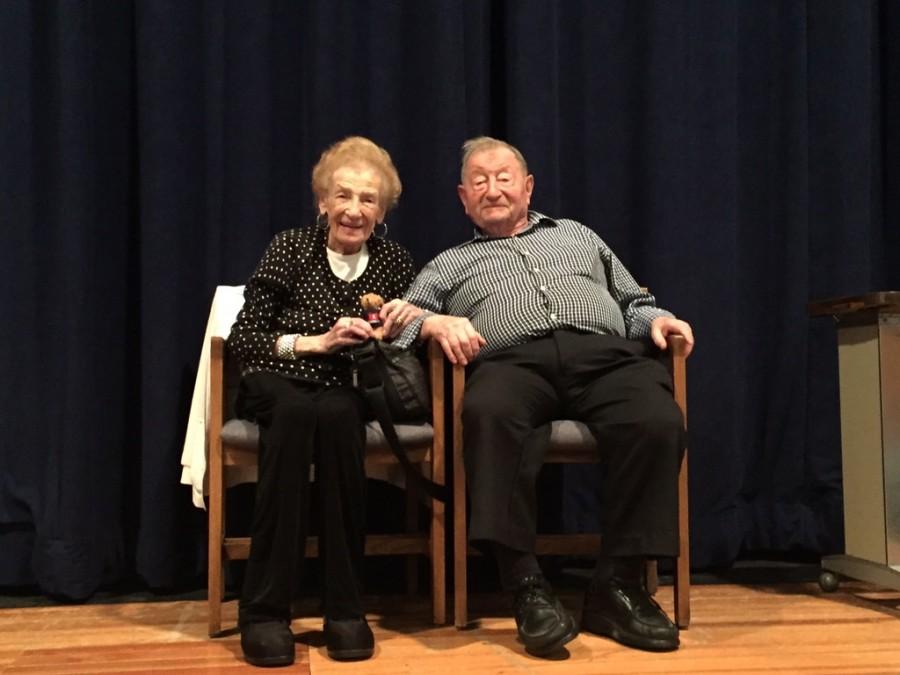Holocaust Survivor Esther Bauer Tells Her Story at Southern Lehigh High School
Esther Bauer came to speak to Southern Lehigh High School about surviving the Holocaust on October 15, 2015.
On October 15, 2015, Esther Jonas Bauer, a 91-year old Holocaust survivor, visited Southern Lehigh High School to retell the horrifying struggles she faced as a Jewish woman in Europe during the second World War.
Bauer was born in Hamburg, Germany, in 1924. Both her father, Alberto Jonas, and her mother, Marie Jonas, were doctors. Bauer was nine years old when Hitler came into power.
Growing up, she noticed how society slowly began to change. New discriminatory laws towards Jewish people were introduced almost weekly. However, the real difficulties began when Bauer and her family were deported to Terezín, Czechoslovakia.
“From one moment to the next, we were prisoners,” Bauer said.
Her father died six weeks later from meningitis.
A congested environment, Terezín lacked mattresses, toilets, and proper food and flooring. Bauer eventually met a Czech-speaking man named Honza Leiner, whom she befriended despite their language barrier. She received a job at a youth organization through a friend, where a co-worker taught her how to speak Czech.
“I had to write down every child and their birth dates on an index card in pencil,” Bauer said. “If a child was sent out for death, I had to erase it and use the card again.”
After working for two years, she and Leiner became engaged despite not being allowed to live together. The Nazis offered Leiner and many other men a job in the city of Dresden, Germany, to build a new ghetto. That, of course, was a lie. They wound up in Auschwitz, a network of concentration camps controlled by the Nazis in Poland, where both Leiner and Bauer’s mother were murdered.
“Sitting on the train, I saw Polish names, not German. I knew we were going to Auschwitz,” Bauer said. “I thought, ‘Well, that’s the end. I’ll be killed. That’s it.’”
Bauer describes Auschwitz as the worst thing she has ever experienced.
“At night, we heard [prisoners] being driven to the [gas] showers, and we heard them screaming and screaming,” Bauer said. “Also, the smell of burning flesh. I will never forget that.”
In April, 1945, Bauer, among one thousand other Jewish women of different nationalities, were sent to a different camp in Freiburg, Germany, where she worked in an airplane factory. Bauer recalls being constantly hungry, consuming only one piece of bread all day, along with a cup of coffee for breakfast and soup for dinner.
“We ate grass because we were so hungry,” Bauer said.
Finally, on May 5, 1945, Auschwitz prisoners were liberated by the American army in Birkenau, Austria. Bauer said it was the happiest day of her life. Over time, she learned American English rather well and began adjusting to the new freedoms given to her.
She eventually got in touch with her American uncle, who sent her an affidavit of support to come to America. She stayed with him briefly and then moved to Washington Heights, New York, where she eventually married and raised her family.
In 2002, she met Bill Engel, her current boyfriend, whom she has known for 13 years and affectionately calls her “boy toy.”
Even after a life full of hardships and being forced to grow up too fast, Bauer remained positive. She was told that she survived because she lived in a shell and let nothing touch her. She also made it very clear that she harbors no hate for Hitler or Germany.
“Hate makes you ugly. Hate makes you sick,” Bauer said. “I do not hate. I cannot forgive them, no. But I do not hate.”
When students heard that a Holocaust survivor would be coming in to speak to them, they had varying reactions.
“Before the assembly I felt a little bit anxious,” junior August Joachim said. “I had an idea of what to expect, but I didn’t have a clue what it would be like to hear a Holocaust survivor recall her experience firsthand.”
Students and staff can thank English teacher Mrs. Amy Bausher for inviting Bauer to share her story.
“I think it is important that students hear directly from a survivor of the Holocaust,” Mrs. Bausher said. “This generation is the last generation that is able to do that. I knew that she left an impression on the students just by the questions they asked, and that was my goal.”
Many were personally affected after hearing Bauer’s story, and felt inspired by her positivity and light-hearted personality.
“Before the assembly I was expecting somewhat of a documentary storytelling, but instead I received a very exclusive perspective on everything that happened during the Holocaust,” junior Jordan Finks said. “It brings me great joy that Esther has found peace, happiness, and positivity after something like this.”
Despite her optimism, Bauer admitted that she does indeed have a lot of anger towards the horrible crimes that took place. She is now an atheist, as she personally cannot believe there is a God who let six million Jews be killed. However, she encourages today’s youth to reform society and make human rights top priority.
“You are the future of America,” Bauer said. “Maybe one of you will be president one day. You have to see to it that this never happens again.”
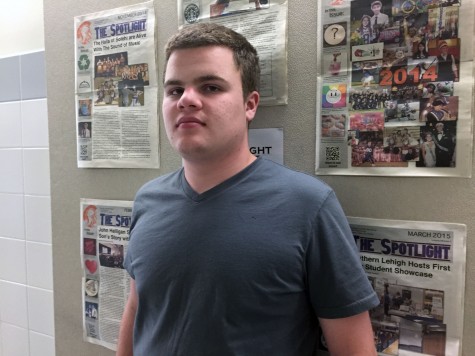
In his senior year as web editor, Alex Baca helped revamp our website and made sure that our online community stayed well-informed on all things Southern Lehigh....
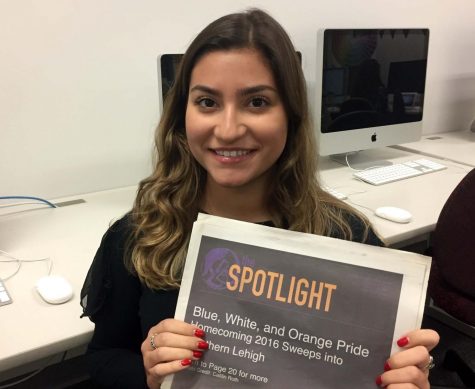
Senior Sarah Trebicka is a four-year staff reporter and former two-year Our World editor, now serving as editor-in-chief for the Spotlight. In addition...
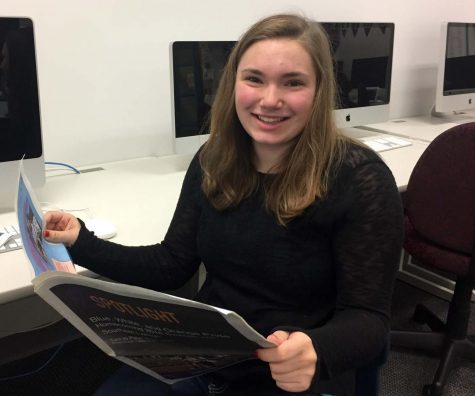
Senior Danielle Alpert four-year staff reporter and former two-year center spread editor, now serving as news editor for the Spotlight. In addition to...
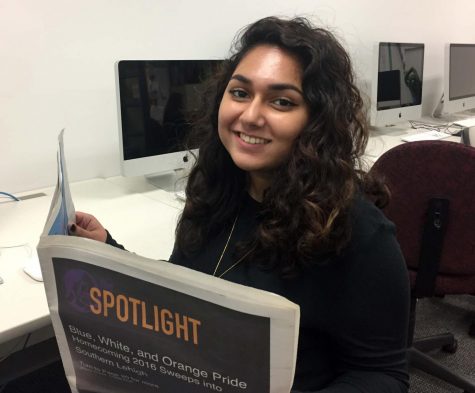
Senior Izza Choudhry is a four-year staff reporter and former one-year copy editor and one-year news editor, now serving as opinion editor for the Spotlight....


